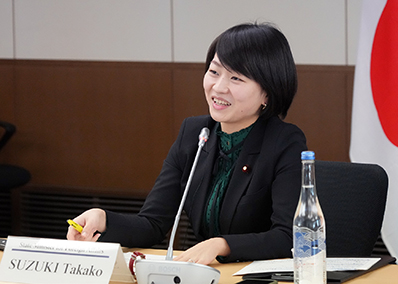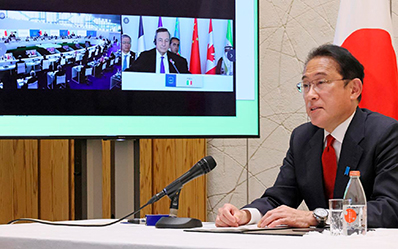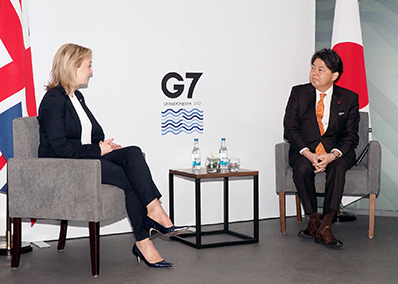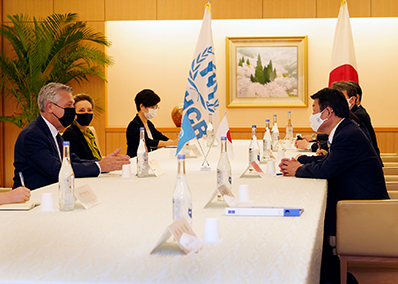(6) Partnership with Other Countries and International Organizations
A. Dialogue with Major Donors

State Minister for Foreign Affairs Suzuki holding a teleconference with USAID Administrator Power (December 2021)
Japan holds dialogues with major donors to exchange views on priority issues and policies.
In February 2021, the Seventh Japan-EU High-level Development Policy Dialogue was held and both sides exchanged views on issues including emerging donors, the COVID-19 response, and climate change. In April, the Japan-UK Development Policy Dialogue was held, and both sides exchanged views on agendas such as the G7-related meetings in 2021, emerging donors, the COVID-19 response, the environment and climate change, and education.
In June, the second Japan-China International Development Cooperation Policy Consultation was held. At the beginning of the meeting, the Japanese side stated that China’s foreign aid has drawn increased attention since the COVID-19 pandemic, and that the Japanese side would like to exchange candid views on various development issues. Both sides then exchanged views on topics such as the COVID-19 response, cooperation under multilateral frameworks, statistics, and evaluation.
In December, State Minister for Foreign Affairs Suzuki held a video teleconference meeting with United States Agency for International Development (USAID) Administrator Samantha Power. State Minister Suzuki explained the priority issues of Japan’s development cooperation policy and stated that Japan would like to collaborate with the United States on development challenges faced by the international community. In response, Administrator Power expressed her gratitude for Japan’s contributions including initiatives for improving nutrition such as the Tokyo Nutrition for Growth Summit 2021, as well as cooperation through COVAX, and stated that she would like to further strengthen bilateral relations between the two countries. The two sides also concurred to continue cooperation between Japan and the United States in response to COVID-19 and in the development field.
B. Partnership for the G7 and G20 development issues

Prime Minister Kishida attending the G20 Rome Summit (October 2021) (Photo: Cabinet Public Affairs Office of the Government of Japan)

Foreign Minister Hayashi meeting with Secretary of State for Foreign, Commonwealth and Development Affairs Truss during his visit to the United Kingdom, which was his first overseas visit since assuming his position, in order to attend the Second Meeting of G7 Foreign and Development Ministers (December 2021)
In May 2021, the first G7 Foreign and Development Ministers’ Meeting was held in London, and various matters in the development field were discussed. From Japan, then Foreign Minister Motegi attended. The G7 shared the view that it is vitally important to achieve equitable access to vaccines, treatment, and diagnosis throughout the world, including developing countries, under the concept of universal health coverage (UHC) in order to overcome the crisis caused by COVID-19. The G7 also agreed on the importance of supporting girls’ education that was especially affected by the COVID-19 pandemic, and on addressing humanitarian crises such as famine that are increasingly more serious due to COVID-19. Furthermore, on climate change, the G7 reaffirmed its commitment to mobilizing $100 billion per year in climate finance by developed countries through 2025, and to achieving a balance between mitigation and adaptation.
Then Prime Minister Suga attended the G7 Cornwall Summit held in June. During the Summit, there were discussions on gender equality as an indispensable factor to achieve “building back better” from COVID-19, as well as collective approaches to non-market policies and practices that undermine the fairness and transparency of the global economy as measures for “building back resilient.” The G7 also committed to providing support through finance and in-kind contributions equivalent to one billion vaccine doses to end the COVID-19 pandemic. In regard to climate change, Japan expressed its intention to provide assistance which amounts to ¥6.5 trillion to developing countries over the next five years from 2021 to 2025, including further enhancement of assistance for adaptation.
In addition, the second G7 Foreign and Development Ministers’ Meeting was held in December in Liverpool, and Foreign Minister Hayashi attended. In regard to economic partnership, based on the G7 Leaders’ Statement issued on December 3, the G7 reaffirmed the common principles on sustainable and resilient quality infrastructure investment and development finance. The ministers also discussed the new threat of the Omicron variant of COVID-19. The G7 reaffirmed their commitment to contribute towards vaccinating the world in 2022 and on working together to expand regional vaccine manufacturing and regulatory capacity, reinforcing health systems, and delivering quality vaccines and other services.
In regard to the G20, the first G20 Development Ministers’ Meeting was held in Matera, Italy in June, and was attended by then Foreign Minister Motegi. During the meeting, given that the $2.5 trillion annual financing gap to achieve the SDGs has been exacerbated by COVID-19, G20 Ministers discussed the need to diversify financing sources. Ministers also discussed regional development and promotion of the SDGs in rural areas in developing countries, taking into consideration that COVID-19 has made it even more difficult to achieve the SDGs in rural areas.
In addition, Prime Minister Kishida attended the G20 Rome Summit in October. At the Summit, the G20 reaffirmed its commitment to a global response to support a sustainable, inclusive, and resilient recovery across the world, able to promote equity and accelerate progress on all SDGs. The G20 also recognized the critical role of quality infrastructure investments in the recovery phase.
C. Partnership with International Organizations

Then Foreign Minister Motegi meeting with United Nations High Commissioner for Refugees Grandi
In order to address various development issues and facilitate assistance through partnerships with international organizations, Japan holds dialogues with United Nations agencies and major international organizations. In 2021, Japan held regular policy dialogues with the United Nations Children’s Fund (UNICEF), the United Nations Development Programme (UNDP), the International Organization for Migration (IOM), the Office of the United Nations High Commissioner for Refugees (UNHCR), the United Nations World Food Programme (WFP), and others. In addition, in July 2021, then Prime Minister Suga and then Foreign Minister Motegi respectively held meetings with United Nations High Commissioner for Refugees Grandi and Director-General of the World Health Organization (WHO) Tedros (see “Stories from the Field 8” for Japanese personnel who work at IOM, and Part I for Japanese personnel who work at international organizations).
